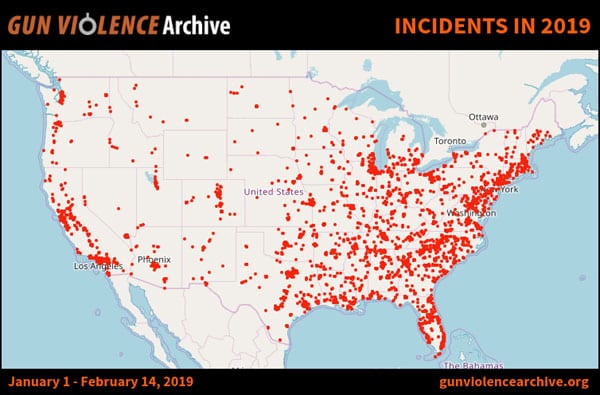
February 13, 2019; Bustle
The leadership coming from the young people of Parkland, Florida will be remarked on repeatedly over the next several days, as the first anniversary of the shooting deaths of 14 of their fellow students and three adults is acknowledged. Their activism has taken many forms. A window into what drives that commitment and resilience may be accessed in another form of their activism #sinceparkland.
Yesterday, students at Marjory Stoneman Douglas High School and The Trace, a nonprofit news site specifically focused on gun violence, published the powerful Since Parkland project. The project involved 200 high school reporters who wrote 100-word pieces on each of the nearly 1,200 children who died as a result of gun violence in the United States last year.
The project helps underscore a point often observed regarding the ubiquity of violence, particularly in communities that are less well-off and less privileged than Parkland. For instance, D’Angelo McDade, who spoke at the March for Our Lives rally that the Parkland students helped organize last March and directs the Chicago anti-violence group Peace Warriors, told NPR that in the communities, largely of color, where he works “gun violence happens every single day.”
An explanation of the Since Parkland project on its website talks about the group’s work as an example of “journalism in one of its purest forms—revealing the human stories behind the statistics—carried out on an exhaustive scale.” The project embodies two-way engagement between the press and the community:
Several partners supported the teen journalists in making it possible. The Trace, a nonprofit news organization dedicated to reporting on gun violence, worked with journalism teachers to provide the students with training and editing. Another nonprofit, the Gun Violence Archive, maintains the running count of shooting incidents from which the project team identified child victims. The Miami Herald provided additional research, several of its journalists reported stories building on the students’ work. The Herald’s siblings in the McClatchy newspaper group contributed stories in their areas. NowThis translated the project to video. Global Student Square helped us recruit more than 100 of the student reporters.
And a writeup from the student reporters reads:
Sign up for our free newsletters
Subscribe to NPQ's newsletters to have our top stories delivered directly to your inbox.
By signing up, you agree to our privacy policy and terms of use, and to receive messages from NPQ and our partners.
For every toddler caught in the crossfire, every fourth-grader gunned down in her home, every high school student murdered, we felt this consuming hopelessness. We were frightened. Angry. Frustrated. Powerless.
With “Since Parkland,” a yearlong editorial project timed to the anniversary of the massacre at Marjory Stoneman Douglas High School in Parkland, Florida, on February 14, 2018, we’ve channeled those feelings into an effort to honor those young victims. We joined more than 200 other teenage journalists to work with editors at The Trace and the Miami Herald to document the toll of gun violence among American youth.
At Parkland, 17 people were killed, 14 of them students. School shootings—their increasing frequency and the clustered loss of young lives—are unfathomable tragedies. But the gun violence affecting young people in our country is much broader. This project includes more than 1,200 profiles spanning a single year. Most of these young people were not shot at school, but at home, on the street, with friends, or while riding bicycles.
With 100-word profiles, we’ve told the victims’ stories. We searched online databases, Facebook pages, police reports and news-feeds to understand whom we lost. Sources were often scarce, but whether we found multiple articles on the victim’s life, or merely a birthdate—sometimes, we didn’t have a name—we searched for the personhood.
We wanted to humanize the children and teens beyond the tragedies, beyond the gunshots in their final hours. We started with the details: nicknames, fashion sense, hobbies, and accomplishments. We emphasized how they lived, not how they died.
Our goal is to shift the attention away from the numbness that seeps into the discussion around gun violence. Names, faces, experiences, aspirations, even mistakes are what comprise the lives we lose every day. In telling their stories, we want to overwhelm you. We want you to feel that every child’s gun death is unacceptable.
There is too little of this kind of journalism, which allows those involved to report their own truths in all of its context and with humanity and immediacy. We are grateful to The Trace for helping to make it happen and to the students for their powerful work in helping to bring the scourge of gun violence home so effectively.—Ruth McCambridge













